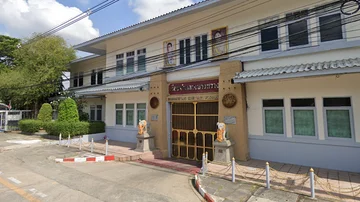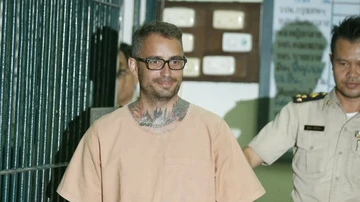In 2022, at least 883 people were executed after being sentenced to death in around twenty countries, according to data from Amnesty International, which represents an increase of more than 50% compared to the previous year. These data do not take into account executions in China, as they are considered a state secret, nor do they take into account summary executions from countries such as North Korea, Vietnam, Syria or Afghanistan. But executions are counted in Thailand, one of the more than fifty countries where capital punishment is still legalized.
This is the doom facing the Spanish Daniel Sanchoson of the well-known actor Rodolfo Sancho and grandson of Sancho Gracia, arrested in the Asian country for murder and dismember a Colombian surgeonand scatter their remains in the sea. “We have consulted with the Prosecutor’s Office about some of the evidence and everything indicates that the charges are sufficient to charge him with premeditated murder, which carries the death penalty“, confirmed the second of the country’s police headquarters, Surachate Hakparn, to the media.
Of the countries in the Association of Southeast Asian Nations, only the Philippines and Cambodia have banned the practice, although Laos and Brunei have not carried out any executions for decades. and if well Thailand was one of the eight countries that approved the most death sentences in 2022 (a total of 104), according to data from the Death Penalty Information Center, in the last 20 years has only carried out 18 executions11 of them in 2002, four in 2003, two in 2009 and the last one, in 2018.
As of December 1, 2022, 212 people were on death rowmainly men (193, compared to 19 women), and although it is still a fairly high number, it is 59% lower than the number of people awaiting capital punishment in July 2018, when there were 528 (441 men and 87 women). , according to data published in the latest report on Thai prisons from the International Federation for Human Rights (FIDH).
Between firing squad and lethal injection
Since 1935, the number of executions in Thailand has been 326. The manner of execute the death penalty in the Asian country It has mainly been by firing squad (319, the last in 2002), while seven have been by lethal injection. Although in the past, Thailand has had much more cruel ways of carrying out this type of sentence: under the so-called ‘Law of the three seals’, there were 21 different types of death sentence, including that of burn the damned alive, wrapped in a cloth soaked in oil. More recently, in the 1950s, executions in Thailand were carried out by firing squad with the condemned tied to a cross, although since 2003 the firing squad ceased to be the method of execution in the country, becoming lethal injection the methodology applied in these cases.
The most recent execution in Thailand took place in June 2018: Theerasak Longji, born in 1992, was convicted of the robbery and murder of a 17-year-old boy, stabbing him 24 times. He was found guilty, sentenced to death, and executed at just 26 years of age in Bang Kwang prison, where it was initially believed that Daniel Sancho was going to be imprisoned —currently the Spaniard is in the koh samui jail—. It was the first execution in Thailand in nine years and the last carried out, to date.
From death sentence to execution
In Thailand, capital punishment is not carried out immediately, after being imposed. There is a time that the convicted person must enjoy, a time in which he can file two appeals after the sentence. In the case of ratifying the death penalty, the time is extended to allow the prisoner to request the king’s pardon, as happened with the Spanish Artur Segarra, convicted in 2019 but whose capital sentence was commuted to life imprisonment at the behest of the Thai monarch.
Executions in Thailand are usually carried out every time in the same prison in Bang Kwangunpopularly known as ‘the Bangkok Hilton’, although there are death rows in other provincial prisons as well.

Bang Kwang Central Prison | google maps
The 35 crimes sentenced with capital punishment
Thai law allows the imposition of a death sentence for 35 crimes, including treason, murder and drug trafficking. Most of those sentenced to death in Thailand were for crimes related to drug trafficking: in fact, of the 212 sentenced to death at the end of last year, 60% had been sentenced for this type of crime. crimes. Among women, this percentage was much higher: 79% of those sentenced to death (15 out of 19) were for crimes related to drug trafficking.
No one is spared from capital punishment in Thailand. In 2022, former Vice Minister of Commerce Banyin Tangpakorn was sentenced to death instead of the life sentence previously charged, for the murder of a judge’s brother. These are Some of the crimes that carry the death penalty in Thailand:
- premeditated murder
- Kidnapping
- Terrorism
- Espionage
- Treason
- economic crimes
- Drug related crimes
The Thai Penal Code also includes the sexual crimes such as rape among those who could carry the death penalty. However, in 2016 the Ministry of Justice confirmed its intention to do not execute death sentences on rapists, to avoid that, in addition to the sexual crime, they committed murders. “If rape is equivalent to the death penalty, rapists would be encouraged to kill all their victims to keep them quiet,” a ministry official said at the time.
The Thai Police receive some 4,000 reports of rape each year and carries out some 2,400 arrests for these cases. However, according to a public policy research institute that obtains data directly from the Ministry of Justice, the number of unreported rapes is around 30,000 per year, which would imply one rape every 15 minutes.
Can a convicted person request transfer to Spain?
Thailand does not have any extradition treaty signed with Spain, so, according to diplomatic sources explained to Europa Press, every time a Spaniard is imprisoned in a country without an agreement, an attempt is made to negotiate a new one. However, Spanish prisoners abroad have right to request a transferalthough for this to be carried out, the two governments involved must previously accept it.
According to sources from the Ministry of Foreign Affairs consulted by the +34 Foundation, which provides support to Spaniards imprisoned outside of Spain, there are a total of 907 Spaniards distributed in prisons around the world. These almost a thousand prisoners are in prisons in 69 different countries, mainly in Europe and northern Morocco: the majority of Spaniards imprisoned abroad are in prisons in France, Germany, Belgium, Portugal and Morocco. The most common crime, drug trafficking.
In Thailand they are currently five Spaniards imprisoned, including Daniel Sancho. The main problem of thailand prisonsaccording to the director of the foundation, Javier Casado, is the overcrowding, to which is added the “lack of adequate food, the high temperatures” and, of course, the language barrier.
No Spaniard executed, but sentenced to death
Till the date, no Spanish citizen has been executed in Thailandalthough Daniel Sancho will not be the first to be sentenced to death, if it is. In 2016, the Catalan Artur Segarra was arrested for the murder of his compatriot David Bernat in the Southeast Asian country. With a search and capture order from Spain since 2015 for evasion of justice, Segarra was accused of kidnap, torture and dismember businessman David Bernat, also Catalan, and try to dispose of his body by throwing it into a river in the capital, Bangkok.

Artur Segarra | lasexta.com
Bernat, a telecommunications consultant, and Segarra had previously known each other and sometimes went to party in Bangkok. Both stayed the night of January 19, 2016 in the capital of Thailand, the day on which Segarra kidnapped his compatriot, whom he kept for seven days in the apartment which he had rented in Bangkok. According to the police report, Bernat was murdered between January 26 and 27. The first remains of Bernat’s dismembered corpse They were found on January 30 in the Chao Phraya River, which runs through Bangkok, and six days later the Police identified Segarra as the main suspect.
The Spaniard, after being recognized in a restaurant in the province of Surin, fled to Cambodia, where he was arrested two days later and handed over to Thai authorities on February 8. Upon his arrival in Bangkok, Segarra was placed in pretrial detention while the police continued their investigations, conditioned by Segarra’s lack of cooperation. Like Sancho, Segarra was captured by security cameras while he was buying the tools with which he allegedly committed the crime.
were also captured images of the Spaniard leaving his apartment in Bangkok on a motorcycle and loaded with large bags and boxes, to return hours later without the packages. In Segarra’s apartment in the Thai capital, traces of blood were also found in the pipes, whose subsequent analysis determined that they were from the victim, among other evidence. Segarra pleaded not guilty on numerous occasions, and went so far as to ensure that they had “set a trap” for him. The defense of his innocence was not enough to get rid of capital punishment and in 2019 he lost his second appeal, so the death sentence continued current.
Segarra confessed for the first time to being the author of the crime in a letter, dated December 23, 2019, with the aim of asking the King of Thailand for clemency and avoiding his execution. The convict admitted in the letter, to which EFE had exclusive access, that on the night of January 19, 2016 killed Bernat by reacting violently during an abrupt fight with the victim, although he avoided commenting on what happened after the murder.
On August 17, 2020, the monarch granted a royal pardon on the occasion of his 68th birthday, which Segarra benefited from, who saw his sentence reduced to life imprisonment, which opened the door for the prisoner to initiate the request for transfer to a prison in Spain. Segarra, who has been imprisoned for more than seven years since he was remanded, is still waiting in the Bang Kwang maximum security prison in Bangkok for his future transfer, for which there is still no date.
Source: Lasexta
Ricardo is a renowned author and journalist, known for his exceptional writing on top-news stories. He currently works as a writer at the 247 News Agency, where he is known for his ability to deliver breaking news and insightful analysis on the most pressing issues of the day.












